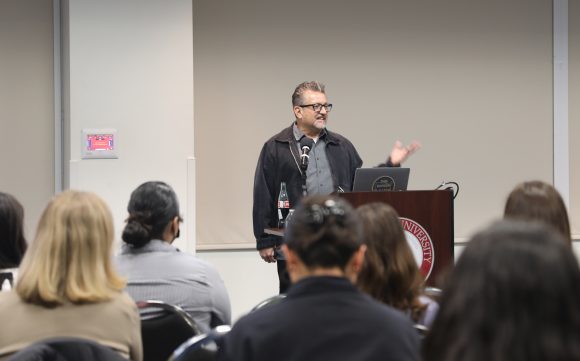
A Talk with Lalo Alcaraz: Editorial Cartoonist, Chicano Artist, TV Writer and Producer
December 13, 2022
Wilkinson College of Arts, Humanities, and Social Sciences recently welcomed editorial cartoonist, Chicano artist, and TV writer and producer Lalo Alcaraz to speak about his politically themed and nationally syndicated comic strip “ La Cucaracha” as a part of the Engaging the World: Leading the Conversation on Ethnic Studies series.
Alcaraz’s “La Cucaracha” strip, first published in LA Weekly in 1992, has been featured in the New York Times, the L.A. Times, Hispanic Magazine, Latina Magazine, Mexico’s La Jornada and many other publications. “La Cucaracha’s” comic strip characters reflect his view of Latino culture in the United States.
According to Alcaraz, “satire is another language” that allows him to highlight not only his Chicano culture and childhood as a Mexican immigrant in San Diego, but also issues of politics, public health, and humanity.
Alcaraz also provided attendees with clips of his animated, humorous cartoon, “Super Vaccine Vato,” which he deemed to be the new Lalo Alcaraz/Pocho Villa Productions public health hero. According to Alcaraz, the seven short episodes covers issues ranging from vaccine hesitancy to Covid’s impact on mental health, public health messaging created specifically for the Latinx community.
Luke Guerinot, attendee and first-year Communication major at Chapman, agreed that Alcaraz’s comic strip serves as a form of activism toward issues of public health.
“I definitely see art as a form of activism because it offers a new way of looking at a certain topic, comedy is a large part of Alcatraz cartoons and it’s strategically combined with messages that need to be heard,” Guerinot said. “I thought his characters were very comical but also provided helpful information about Covid relief or other matters.”
Associate Dean of Wilkinson College and Chapman Anthropology professor Stephanie Tagaragawa spoke about the elements of perspective and comedy in Alcaraz’s work.
“I attended the event because I am quite a fan of Alcaraz’s work. I have seen his strip for many years and I think it’s super funny, and insightful, sometimes the satire is a little rough, but it allows us to look at the world in new ways and through someone else’s eyes,” Takaragawa said.
Alcaraz also presented his work, “Muerto Mouse,” which he began drawing to protest the Walt Disney Company’s attempt to trademark the term “Dia de Los Muertos” for merchandise associated with their Pixar movie “Coco.”
“I drew this cartoon in response to their (Disney’s) action, and they quickly withdrew their applications (to trademark). Pixar would eventually ask me to be a cultural consultant on the animated film, to hopefully ensure they don’t make any more mistakes like the trademark,” Alcaraz told the audience.
According to Takaragawa, satirical cartoons can highlight social issues in an “easier-to-digest” lighter way than mainstream media.
“(La Cucaracha) are short cartoons that often talk about really important and challenging topics and having them in that quick, easy-to-digest format, just helps make things easier. I think his work is really a good commentary on a lot of social issues and contemporary issues, especially from a multicultural point of view,” Takaragawa stated.
In 2021, Alcaraz received the Library of Congress’s Herb Bloc Foundation award for his “La Cucaracha strip,” as well as his contributions to projects at Nickelodeon, Cartoon Network, Disney, Fox and Xbox, and as a Cultural Consultant on the Oscar-winning animated Pixar film “COCO.”



